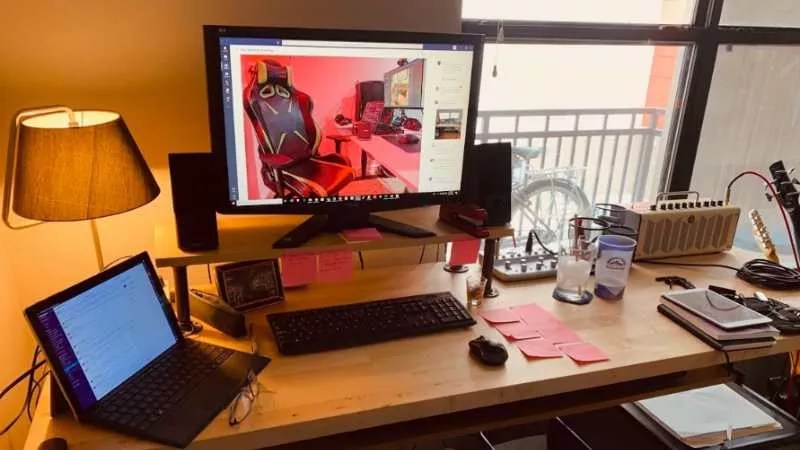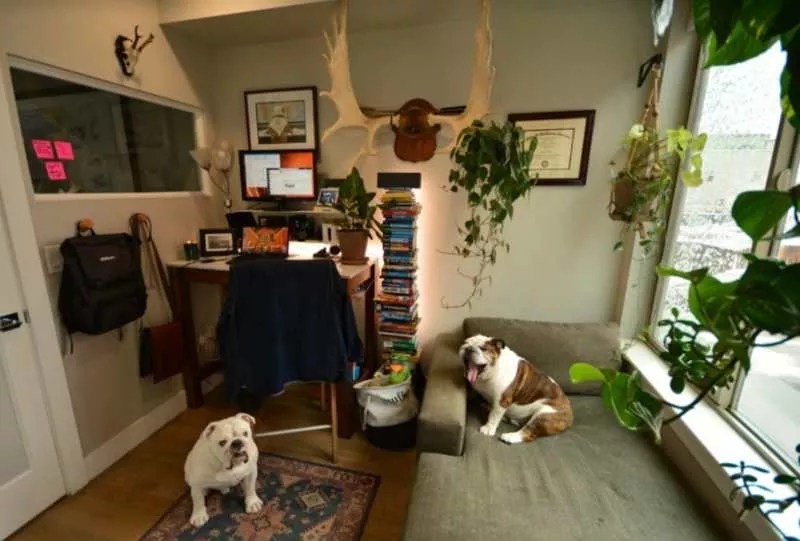
Courtesy of Slalom

Audio By Carbonatix
Even before he issued a stay-at-home order for the entire state in response to COVID-19, Governor Jared Polis encouraged all businesses, whether they’re designated as essential or non-essential, to facilitate ways for employees to do their jobs remotely. Among those displaying the most creativity and progressive thinking early on was Slalom, an international consulting firm with a major stake in the Denver market.
The nature of Slalom’s business meant few of its 500 local employees, including 330 in Denver proper, regularly worked from home. So the company offered cash stipends to staffers to help make their space more comfortable and productive, and initiated a slew of online gatherings, many of them – like virtual happy hours – non-work-related, in order to fight isolation and rekindle the sense of camaraderie that earned Slalom plaudits from the likes of Forbes, which included the enterprise on its list of 100 best companies to work for in 2020.
Despite its global size and scope, Slalom in Denver is “a local consulting firm first,” says Kylee Eikenberg, the director of talent and strategic operations for the Mile High City affiliate. “Our folks based in the Denver market are working on local Denver clients,” with the occasional exception of those assigned to the so-called Slalom Build center. “Those are developers, architects, hands-on teams that might work with clients in Denver or Seattle or Chicago.”
The rest spent a lot of time “visiting client sites” in addition to working out of Slalom’s main Denver headquarters, at 1899 Wynkoop Street. “But as things were changing with COVID-19, our first focus was making sure our people were safe,” Eikenberg explains. “We needed to find out if any employees at client sites were being tested and then go through a transition to work-from-home scenarios.”
Because “not everyone was set up for success” from a home-office perspective, Eikenberg notes, “we gave money to folks to help” – $100 each for most Denver employees. “We also offered tips and tricks about how to work remotely, and we’re continuing to push that into trainings using platforms like Zoom and Microsoft Teams. There are even some tools that cancel background noise out there. So it’s all about figuring out what are the different things we should have in our tool belt to help our people interact with our clients and make sure we’re still connecting.”

A memorable home work space created by a Slalom employee.
Courtesy of Slalom
Nonetheless, business as usual wasn’t possible, she acknowledges: “Empathy was really important for us. Schools are canceled and all our employees have new office mates, whether it’s roommates, toddlers, teenagers or whoever. We realized our day-to-day was going to change, and we needed to figure out how we were going to support each other. Like if someone has a child who’s having a meltdown, how do we cover for that?”
With that in mind, “we based a lot of what we’ve been doing on culture pieces,” she goes on. “Now, with all of us hunkering down at home, and with social distancing, we needed to figure out how we could maintain that sense of community and connection. So we’re doing more frequent virtual town halls. We’ve done state-of-the-office meetings once a month, and we’re continuing with those to help us keep that state of normalcy. We’re also having fireside chats and open forums and checking in regularly with people, just to see how they’re doing. Because not every touchpoint you have with people has to be about business.”
To that end, Eikenberg reveals, Slalom groups are regularly corresponding about a wide variety of topics. “Some of them will present their favorite cocktails, what they’re drinking right now. They might be sharing about new hobbies they’re taking up. Some people have done things like MTV Cribs, taking people on tours of their new work spaces. We’ve also done ‘Meet my new co-worker,’ where they introduce everyone to their spouse or their kids or their furry friends. We’re looking at virtual games we can play together: trivia, virtual puzzles. We know people are getting lonely and maybe going a little stir crazy, so we’re looking at how we can alleviate some of those issues.”
The same approach is being used for clients, she stresses: “We can’t have the kind of hallway conversations with them that we usually do, so we’re doing more frequent check-ins, just making sure they’re doing okay. Since this is a new world, we’re trying to do all the little things, like acknowledging emails to let people know we’re working on things, that we understand their business and want to know how we can help them out.”
Slalom has also adjusted its usual efforts to support the community as a whole. Right now, in lieu of events such as in-person food drives, the company is matching employee donations to the Denver Public Schools Foundation’s food security fund up to $2,000.
Other shifts are inevitable. “This situation is evolving daily,” Eikenberg concedes. “I’m on a call every morning at 7:30 with our local executive leadership team, trying to assess so we can constantly move and change with what we’re learning as things continue to unfold. We’re all faced with a new problem set, and we need to think about, how do we innovate and take those problems and flip them upside down and create some different perspectives? That’s really important to us and to our employees and clients, and it’s going to be just as important as our community and this world is tackling COVID-19.”